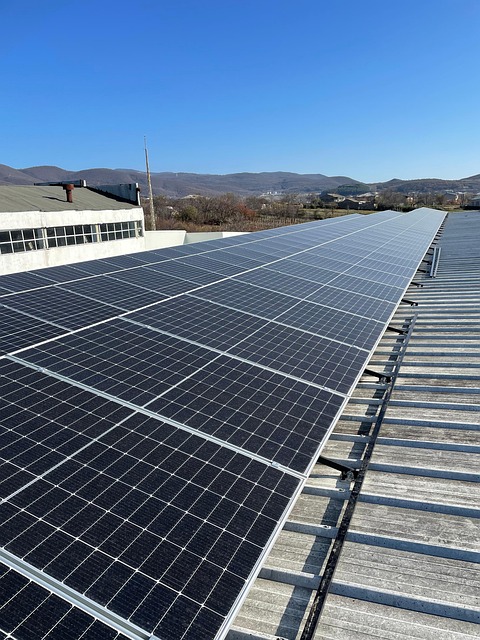Commercial solar panels offer offices a powerful way to cut energy costs while boosting sustainability. Installing tailored solar systems can deliver rapid returns, reduce carbon footprints, and enhance your building’s efficiency. With expert design and seamless installation, businesses benefit from long-term performance and reliable support—turning rooftop space into a smart asset for both the environment and the bottom line. Explore how commercial solar transforms office energy use today.
Introduction to Commercial Solar Solutions for Office Buildings
Solar Panels for offices represent a vital step toward achieving energy independence, cost reduction, and sustainability in the commercial sector. Integrating solar power into office buildings enhances operational resilience, especially during grid outages, while supporting environmental commitments.
In parallel : What Will Be the Future Impact of Brexit on UK Trade?
Utilizing rooftop space effectively makes a significant difference. AlphaGen Energy’s comprehensive offerings include designing and installing tailored solar panel systems that optimize energy production for office spaces. A detailed understanding of costs, savings, and financing options is essential.
The benefits extend beyond cost savings. Installing commercial solar panels helps businesses lower their carbon footprint, meet ESG targets, and align with green office trends. These systems are designed to be durable and efficient, providing dependable energy performance over decades.
Also to see : Unlock flavor and value with wholesale coffee beans today
The process of installation involves careful planning—surveying the site, assessing structural capacity, obtaining necessary planning permissions, and selecting suitable equipment. The upfront investment may seem significant but often yields a positive ROI within a few years, driven by reduced energy bills and potential government incentives in certain regions.
Key components include high-efficiency photovoltaic panels, advanced inverters, and optional energy storage systems, all supported by warranties that ensure long-term performance. Ongoing maintenance, typically minimal, ensures continued system productivity and maximizes returns. This meticulous approach enables office managers and business owners to harness the full potential of solar energy efficiently.
Commercial solar solutions are versatile, adaptable for various office environments, from small corporate headquarters to large office campuses. Their rising popularity indicates a shift toward more sustainable, cost-effective energy management. The integration of solar with office-specific energy systems drives further efficiencies, enhances security, and fosters a greener image.
Investing in Solar Panels for offices is a strategic decision, aligning business operations with modern sustainability expectations and technological advances. The long-term financial and environmental gains make it an increasingly attractive option for enterprises aiming to reduce operational costs and strengthen their commitment to greener practices.
Benefits and Economics of Office Solar Panels
Financial Benefits and Return on Investment
Office solar power systems provide immediate cost savings. By converting sunlight into usable electricity, these commercial solar energy solutions reduce the reliance on purchased grid electricity, yielding lower monthly bills. For a standard office installation, upfront investment can range from £16,000 to £60,000 for systems sized between 2 kW and 5 kW. This outlay is recouped swiftly through consistent reductions—businesses can expect annual savings of £4,595 to upwards of £11,895, depending on system size and office electricity consumption. The usual payback period for well-designed commercial solar installation processes is 4 to 5 years, and the return on investment for office solar systems can reach from 16% up to 45%.
Financial incentives bolster these economics. While direct government grants have largely ceased, offices benefit from a 0% VAT rate and potential grants aimed at sustainable business improvement. Solar panel financing options for companies also make commercial adoption more viable, while selling excess energy back to the grid further accelerates savings. This compounding financial benefit places commercial solar firmly on the radar for forward-thinking businesses evaluating long-term cost savings with solar energy in offices.
Cost Factors and Investment Considerations
The true cost of choosing solar panels for office buildings includes more than the photovoltaic modules themselves. Key expenses are split between panels, high-efficiency inverters, mounting frameworks, and optional battery storage for added resilience. Installation specifics—such as roof space, office energy demand, access equipment, and system complexity—strongly affect total outlay. Businesses with higher electricity consumption or larger facilities must budget accordingly to achieve optimal energy efficiency in commercial buildings.
Initial capital can be significant, but various payment models address this challenge. Solar leasing for offices and tailored finance arrangements permit businesses to distribute costs and engage top-tier commercial solar panel manufacturers. This flexibility supports both immediate project realization and consistent operational savings through the lifespan of the system, reducing office energy bills with solar from day one.
Environmental and Business Advantages
Implementing corporate sustainability solar initiatives generates measurable environmental impact. Solar panels produce clean energy, delivering a direct reduction in office carbon emissions—up to 5 grams of CO₂ per kWh generated. This enables companies to demonstrate meaningful progress toward carbon reduction goals for offices while supporting broader ESG commitments. Systematic integration ensures that each office solar power system upgrades property value, strengthens a company’s sustainable office energy strategies, and supports workplace sustainability initiatives with solar.
Commercial solar installation also amplifies a business’s resilience. By storing excess energy or integrating with smart management systems, offices gain increased independence from grid volatility and shield themselves from electricity price hikes. The upgrade enhances the eco-friendly profile of the workspace and contributes to better indoor air quality through power sourced from renewables.
Sustained by strong warranties—typically 25 years for panels—combined with low solar panel maintenance for businesses, these solutions cement a reputation for reliability and innovation. The growing adoption of office rooftop solar systems and ground-mounted solar for large office campuses underpins the expanding trend toward green office design and robust energy independence with solar in offices.
Technical Aspects and Installation Process
Office solar power systems begin with a meticulous site evaluation. Specialists inspect the structure’s roof condition, available space, and structural integrity, confirming that commercial solar energy solutions are safe and effective. This first step determines if office rooftop solar systems or ground-mounted solar for large office campuses offer the best match for each property. Assessors also consider office energy demand and solar capacity planning, reviewing current and projected usage to ensure accurate sizing.
System Design and Components
In the design phase, experts tailor solar power system design for commercial use to each office’s energy requirements. The panel selection process weighs up solar panel types for businesses, choosing the models with the best commercial solar panel efficiency ratings to maximize energy efficiency in commercial buildings. Considerations include durability, shade tolerance, and solar panel warranty and lifespan—vital for long-term savings.
Modern commercial solar energy solutions integrate inverters for converting DC to AC, essential for everyday office appliances. For enhanced reliability, many commercial installations pair panels with solar energy storage options for offices. Batteries help manage consumption and enable energy independence with solar in offices, supporting ongoing operations during grid outages. Energy management systems offer real-time energy consumption tracking for solar-powered offices, allowing facilities managers to fine-tune use and optimize return on investment for office solar systems.
Integration with the building’s electrical infrastructure is carefully engineered. Electricians ensure compatibility with office HVAC systems and solar-powered office equipment. This reduces office energy bills with solar while supporting sustainable office energy strategies.
Permits and Regulations
Installing solar panels on office roofs generally requires compliance with local planning policies. In the UK, planning permission is often not necessary for commercial solar installation process if panels do not protrude more than 200mm above a pitched roof (or 1m above a flat roof) and are discreetly placed. However, considerations for solar installation on historic office buildings or properties in conservation areas are stricter, necessitating advanced approval from local authorities and the Distribution Network Operator (DNO). Commercial solar incentives may depend on regional regulations and meeting eligibility for available solar energy grants or rebates.
Experienced installers simplify this process, handling DNO and planning applications. They help businesses benefit fully from tax incentives for commercial solar and commercial solar energy grants, whenever accessible. This ensures regulatory compliance and maximizes the benefits of solar panels for businesses.
Installation Timeline and Project Management
The typical commercial solar installation timeline—from detailed site survey to operational system—can span several weeks to a few months, influenced by system size, location, and planning requirements. For large or complex installations, project management may involve close collaboration with architects, site consultants, and office contractors.
Detailed proposals are crucial. Each outlines commercial solar system sizing based on unique office energy consumption, ensuring the solar panels provide optimal cost savings with solar energy in offices. On-site safety is prioritized through certified installers and strict adherence to health and safety protocols throughout the installation.
Commissioning marks the final stage—triggering energy production and, often, immediate reductions in electricity costs. Post-installation, solar panel maintenance for businesses and ongoing technical support help ensure the solar power ROI calculation meets expectations. This approach future-proofs energy efficiency in commercial buildings, supporting corporate sustainability solar initiatives while achieving measurable reductions in carbon footprint with solar.
Case Studies and Proven Results
Demonstrating Real-World Value
The effectiveness of commercial solar energy solutions is best illustrated through tangible results from diverse sectors. Consider the Broadleaves Care Home project: their office solar power systems reached an annual output of over 85,000 kWh, directly attributing a 21-tonne reduction in CO2 emissions. Fluke Electronics, by integrating commercial solar energy solutions, reported yearly generation upwards of 38,000 kWh, collectively preventing 95 tonnes of carbon from entering the atmosphere—a clear testament to the benefits of solar panels for businesses aiming for carbon reduction goals.
Moto Hospitality exemplifies the scale achievable with office rooftop solar systems across 15 sites. Their installation, totaling 1,614 kWp, resulted in 342 tonnes of CO2 offset annually, akin to removing 68 cars from city streets. Coventry University opted for office solar power systems across multiple buildings. Their energy efficiency in commercial buildings strategy delivered over 36,000 kWh per year, lowering their carbon footprint by 76 tonnes. For manufacturing clients like Evans Concrete, commercial solar system sizing is tailored for high usage, with a 246 kWp system fueling significant cost savings with solar energy in offices and maintaining robust environmental impact of solar energy metrics.
Analyzing the Impact
All these projects show how reducing office energy bills with solar power and adopting commercial solar installation processes generate quantifiable environmental advantages. By leveraging advances in commercial solar technology, businesses consistently realize high return on investment for office solar systems. The immediate effect is not just a lower bottom line but a sustainable transformation—companies track their progress by solar power ROI calculation and continue to optimize outputs through solar panel maintenance for businesses.
System reliability emerges repeatedly in these case studies. Professional project management—right from accurate solar power system design for commercial use to efficient integration with business operations—ensures projected outcomes are achieved. Moreover, integrating solar with office energy management and selecting appropriate solar panel types for businesses enables customized solutions and maximizes the operational lifespan.
Lessons and Best Practices
Success with commercial solar installation depends on precise planning. Site-specific evaluations inform choices when choosing solar panels for office buildings, ensuring the most energy-efficient fit. Employing reputable installers and using high-quality equipment reduces long-term operating costs and secures the expected solar panel warranty and lifespan.
Regular monitoring and scheduled solar panel maintenance for businesses remain essential for continued high performance and optimum return on investment for office solar systems. Informed decisions on solar energy storage options for offices and energy consumption tracking for solar-powered offices add layers of resilience and financial predictability.
These examples collectively reinforce that the right application of commercial solar energy solutions—from project inception to ongoing support—delivers measurable building efficiency, achieves corporate sustainability solar initiatives, and reliably reduces operational costs for a wide spectrum of enterprises.
Financing, Incentives, and Support for Office Solar Projects
Commercial solar energy solutions open new pathways for businesses seeking to reduce costs and accelerate sustainability. Office solar power systems can be funded through several effective strategies, with each option offering distinct advantages based on operational scale and objectives.
Cost-Effective Funding Strategies
When considering commercial solar energy solutions, companies often weigh the benefits of outright purchases against alternative solar panel financing options for companies. An upfront purchase, while demanding a high initial outlay, grants complete ownership and the potential for maximum long-term return on investment for office solar systems. Alternatively, options such as leasing and power purchase agreements (PPAs) allow businesses to enjoy energy savings and system performance without a large capital commitment, turning solar adoption into a more predictable operational expense.
Access to business loans dedicated to office solar power systems is another pathway. Financing enables companies to install robust office rooftop solar systems and use anticipated cost savings with solar energy in offices to cover repayments, often creating positive cash flows from the outset. Each solution is best evaluated through a comparison of up-front costs, break-even timelines, and scalability for small offices or expansive commercial complexes. These evaluations can leverage tools designed for accurate solar power ROI calculation and energy consumption tracking for solar-powered offices.
Significantly, UK businesses benefit from the zero VAT rate for sustainable commercial solar systems and reduced energy bills, though grant availability has narrowed since the closure of some major schemes. Tax incentives for commercial solar, such as enhanced capital allowances, still support office investments.
Additional Support Services
Partnering with providers who deliver end-to-end commercial solar installation process expertise is invaluable. Leading installers offer preliminary site assessments, commercial solar energy audit services, and detailed feasibility studies. Companies undertake comprehensive design reviews to tailor an optimal solar power system design for commercial use, integrating energy efficiency in commercial buildings as a guiding metric.
Securing planning permissions and necessary regulatory clearances—including those for more complex projects—can be seamlessly handled by experienced teams. Post-installation, reliable solar panel maintenance for businesses, coupled with continuous performance monitoring, assures that office solar power systems meet projected goals. Providers often guarantee operations and performance, providing security for both physical assets and projected financial outcomes.
Long-term, the support extends to system upgrades, battery retrofitting, and warranty management, underpinning office energy independence with solar in offices and ensuring sustainable office energy strategies remain futureproof.
Sustainability Commitments and Corporate Social Responsibility
Deploying commercial solar energy solutions is more than an economic decision—it directly advances corporate sustainability solar initiatives and ESG targets. Installing office rooftop solar systems often leads to positive environmental impact of solar energy by reducing office energy bills with solar, and slashing emissions in line with corporate carbon reduction goals for offices.
Businesses can amplify transparency by pursuing environmental certification with solar energy and reporting on carbon offset from commercial solar. Some installation partners participate in broader programs, such as tree-planting or local energy empowerment, making solar part of a holistic push for workplace sustainability initiatives with solar. These efforts foster a green office ethos, strengthening brand reputation and stakeholder trust, all while benefitting from the operational and strategic gains of integrating solar with office energy management infrastructure.
Through these layered approaches, office solar power systems become critical drivers of efficiency, accountability, and sustainability, representing mature and adaptable commercial solar energy solutions for offices of all sizes.
Summary of Key Insights and Expert Recommendations
Thorough planning stands as the cornerstone of successful commercial solar energy solutions. Precise site assessments and energy audits ensure that office solar power systems meet each business’s unique demands. The commercial solar installation process should include a tailored design phase, careful selection of solar panel types for businesses, and early planning for future scalability. For offices, integrating solar with energy management software optimizes performance and aligns installation choices with long-term goals.
Choosing quality equipment and prioritizing professional installation are vital for office rooftop solar systems and ground-mounted solutions. Reliable inverters, durable panels covered by substantial warranty periods, and robust mounting systems are non-negotiable for system longevity. Experienced providers, such as Geo Green Power and AlphaGen Energy, streamline permit acquisition, commercial solar system sizing, and ongoing compliance with solar power regulations for businesses.
Rapid return on investment (ROI) is one of the main benefits of solar panels for businesses. Analysis demonstrates payback periods often between 4 and 5 years, depending on energy requirements and office energy demand and solar capacity planning. Return on investment for office solar systems is maximized through energy independence with solar in offices and effective solar energy storage options for offices.
Environmental impact of solar energy cannot be underestimated. Each installation significantly contributes to reducing carbon footprint with solar while advancing corporate sustainability solar initiatives. Sustainable office energy strategies and workplace sustainability initiatives with solar panel adoption foster improved corporate reputation and help achieve both short- and long-term carbon reduction goals for offices.
Businesses should actively explore tailored commercial solar energy solutions. Providers renowned for commercial solar project case studies and robust service portfolios guide clients through all phases: commercial solar installation process, financing advice, and aftercare. Solar panel financing options for companies—ranging from outright purchase to solar leasing for offices—lower upfront capital barriers and let companies benefit from commercial solar incentives, tax incentives for commercial solar, and regional solar incentives and rebates for offices.
Ongoing maintenance and monitoring close the loop on investment protection. Structured solar panel maintenance for businesses supports warranty compliance and maximizes return by monitoring output, enabling timely interventions when needed. Commercial solar panel efficiency ratings and regular checks maintain optimal yields, ultimately reducing office energy bills with solar and supporting further cost savings with solar energy in offices.











